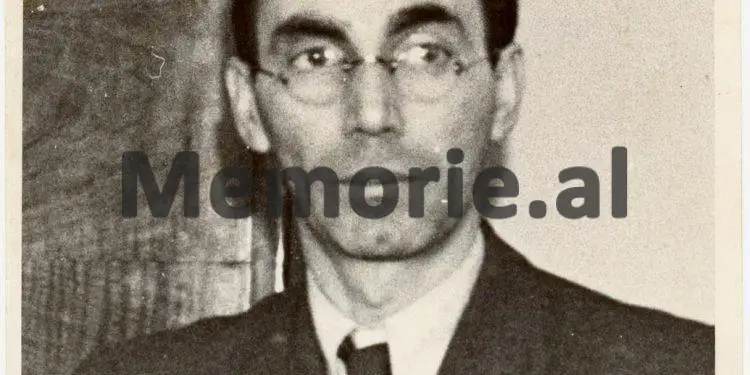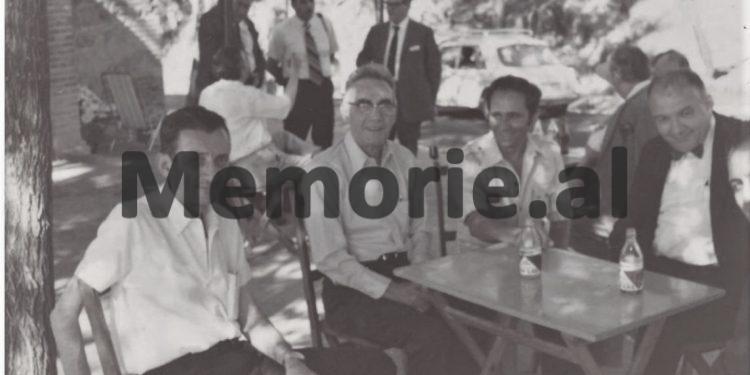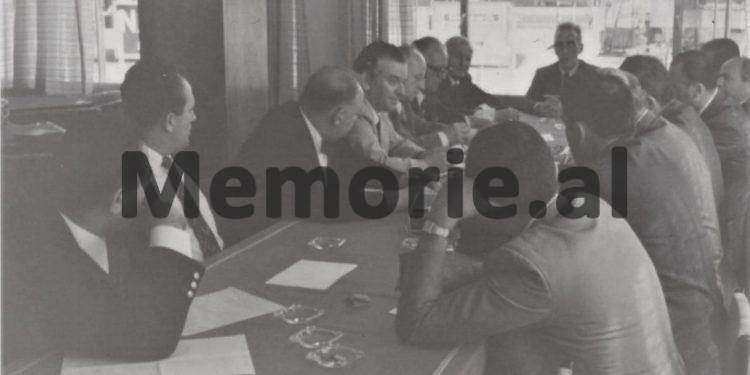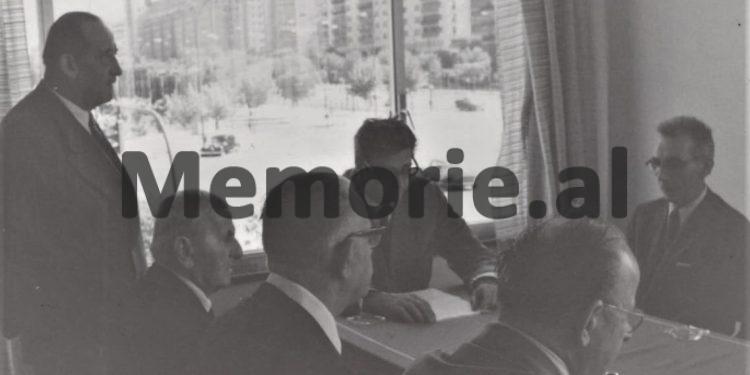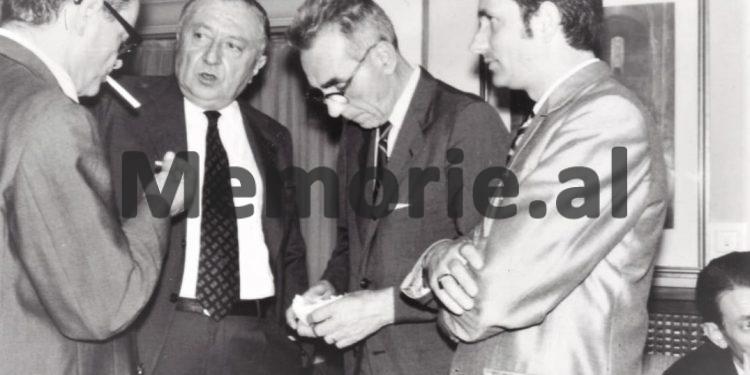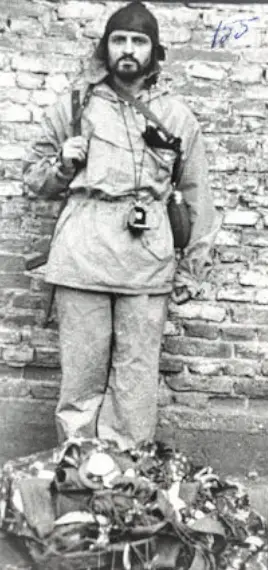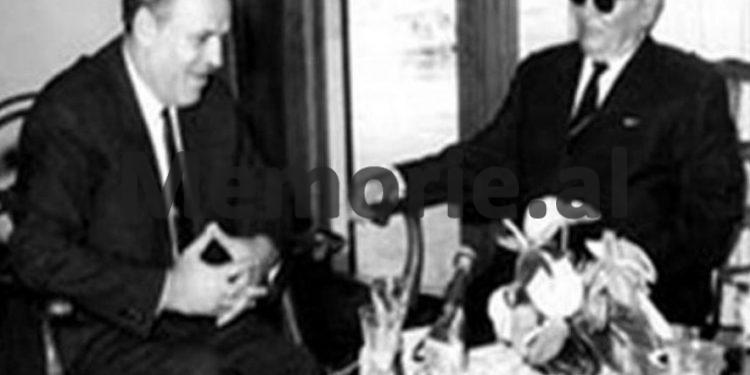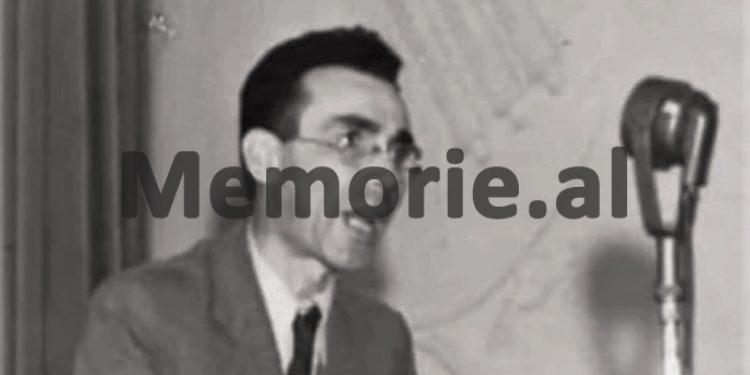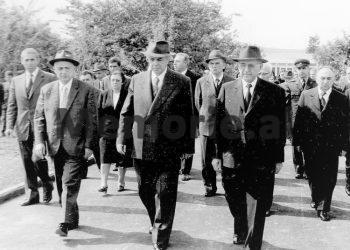By Idriz Lamaj
Part twelve
From the works of the apostles of ethnic Albania
Xhafer Deva
In light of his own letters and other diaspora revelations
Preface
Memorie.al/ Probably like many others, I often browse letters with my friends and associates, who are no longer in this life. Browsing through them, for a moment unfolds memories that it seems to me that some of them can serve our history. Then, I return to the awareness of the current difficult situation in the ethnic homeland, caused by the quadruple of Albanian politics, I say to myself: “What can my memories of others or the letters of the people of dead? ”
Without being the ominous instigator of pessimism, thinking as always of a better future, I return to my obligations to my friends, and as an icy observer of time, without any claim of historical service, when I am given the opportunity of publication, write what I have in mind, always based on their writings and letters. This principle is also followed in this book about Xhafer Deva. I knew Xhafer Deva in person; we exchanged visits and had a strong correspondence.
I spent days off at his house and inherited all of Xhafer Deva’s correspondence with Rexhep Krasniqi, his closest friend, for more than 40 years. After many years, I talked on the phone with Mrs. Deva’s daughter and son-in-law. In the conversation going on, taking advantage of the old friendship, I asked about his letters and they informed me that it was all Qefali Hamdia, a friend of their family.
In June of last year (2001) I went to Kenosha, Wisconsin, a guest of Qefali Hamdia, to look at Xhafer Deva’s correspondence, which Mrs. Deva sent her years ago, when she, due to her advanced age, was closed his house to go to the house of his 5th daughter and son-in-law, Mrs. Burgl Dagmar and Rev. Dennis Logie.
After reading the bulk of the letters, in the languages I knew, I took with me more than a thousand pages of his correspondence, covering a period of over 30 years, 1945 – 1978. Xhafer Deva spoke and wrote seven – eight languages. His correspondence is: Albanian, English, German, Italian, French, Turkish and Serbian. Xhafer Deva’s letters and writings, with the exception of those in Old Turkish and Serbian in Cyrillic, are mostly typewritten, well-kept, and alphabetically arranged, with the persons he dealt with.
That includes his family letters. He carefully kept a copy of every letter he sent and every letter he received. Mrs. Oswalda Deva, daughter Burgl, son-in-law Dennis Logie and Mr. Qefali Hamdia with family, expressed his heartfelt thanks for the trust they gave me. With special gratitude I recall here the help given to me by my brothers – Captain Nue Gjomarkaj and Nikoll Gjomarkaj, in the preparation of one of the most important chapters of this book.
Kapidan Nou, in addition to making available the subject on Xhafer Deva’s relations with the ‘Independent National Bloc’ and sending paratroopers to Albania and Kosovo, reviewed with me each document of that period, and we formulated the text in the form of a conversation; while Nicholas, deciphered the letters, transcribed and translated from Italian, the unpublished materials to date, which were published in this chapter.
Continues from the last number
Xhafer Deva’s life and activity in exile
– Kosovo in the time of Ethnic Albania –
Xhafer Deva in the light of his own letters
Xhafer Deva’s relations with the ‘Independent National Bloc’ and their parachute missions in Albania and Kosovo
He comes to Rome with a certain mission to kill me and he does not perform his duty, but he tells me – bac I kill myself first, because I kill you – i.e., he does not perform the duties assigned by UDB. Roger and I have explained everything to him and we have been trying for a month to change his mind and hide it somewhere in the West. He again insisted that he had given his oath to Sheh Hasani and that “Shehi worked for us” and could not betray him, while on the other hand, he went to Popovic and returned to Yugoslavia, where, of course, after terrible tortures, he was sentenced to 20 years in prison. Only Hajredin could do such stupidity. He had himself in the neck that he may have taken many others in the neck, in an attempt to save his own life.
When writing about these issues in Albania or Kosovo, scholars should be very careful in using the “documents” of that time, fabricated either by the Yugoslav UDB or the Albanian State Security. Distinguish between those who may have been collaborators of the State Security of these two countries, and not to put in one mold all the leaders of Albanian nationalist groups in exile. I have often noticed in articles published in the last ten years, to say that the leaders of the ‘Bloc’, such as Gjon Marka Gjoni, Koliqi and Vërlaci, were in the service of the UDB.
In addition to the documents that these people have preserved and the numerous documents of Italian and American agencies of that period, even the simplest man, but with sound logic, can make a difference. These three persons (Captain of Mirdita, Koliqi and Vërlaci), being closely connected with the Italian and American services, in the intelligence and combat missions, could not be collaborators of the UDB. Italy’s strained relations with Yugoslavia over territorial issues and the US anti-communist strategy at the height of the Cold War are in stark contrast to allegations of their co-operation with the UDB.
It should not be forgotten that UDB, with great skill, in the mounted processes has used letters, reports and allegedly authentic evidence, to justify the cruelest oppression against Kosovars. Deva’s work files, notes, letters exchanged with these people and with his American and Italian friends, not only prove the opposite, but expose their deep enmity with communist Yugoslavia. The leaders of the ‘Independent National Bloc’ have officially exposed the UDB’s efforts to get in touch with them. In another article, we will deal in more detail with Cedo Miovi.’S meeting with the leaders of the ‘Bloc’, the conversation between them and the conditions of the ‘Bloc’ on the Yugoslav request for cooperation against the communist regime in Albania.
Exactly on this issue, Deva wrote to Koliqi on June 12, 1951: “You did very well to formalize the meeting and set the conditions. I was convinced he did not ask about me. If you ask any of them, you say – ‘Deva is in Bari. They know very well who is supporting us and helping us. ‘Xhafer Deva at that time lived in the districts of Bari, near the American military camp, where the paratroopers were trained. A year ago (April 9, 1950), Deva wrote to Krasniqi in Australia: “The outbreak of a war in the Balkans and beyond should not leave us unprepared. We cannot do miracles, but with a battalion, which I believe I can create and lead, we can break a point of the border, as soon as I enter the Dukagjini Plain”.
Deva’s parachute missions in Kosovo require a thorough study. Of particular interest is the tracing of documents about the assassination of Captain Riza Osmani, a problem which was also dealt with by the Italian and American military circles of the time. Riza Osmani “Oscar”, was the commander of the ‘Kosovo Group’. Based on Deva’s writings, he was the most prepared person for the mission. The day he left by plane, he had with him the money – ARIN – for Gjoni, Kola and Alushi. He also had with him the last secret digit, which he had to use only in case of emergency. The more I traced his tragic end, the more I created the impression that uncovering his murder requires a tracing beyond Deva’s letters and notes.
According to the data (radio-communications communications), Captain Riza Osmani and Nue Frisku were killed during the flight from the plane. During the landing of the ‘Kosovar Group’ in the Laje field, Gjon Gjinaj and prof. Alush Leshanaku, the two group leaders who had prepared the ground and were waiting in the landing area. It is also known that this group, departed by plane from Bari, Italy and not from the Island of Monte Cristo. From a letter of prof. Ernest Koliqi, sent to Deva, on March 3, 1951, states: “The meeting discussed the issue of liquidation of the late ‘Oscar’. At the Ministry of War, you were also discussed. The Chairman (Admiral Talragio, I.L.) will take care of me personally explain the work… “!
Although Koliqi’s letter is written in figures, let this special paragraph be understood that regarding the murder of Captain Riza Osmani, the Italian Ministry of Defense has also been taken. Six months later, (December 1950), in a communiqué of the Ministry of Internal Affairs of Albania, broadcast by Radio Tirana, on what he describes as a “reckoning” with the groups that were thrown in Albania, among other things it is said that: from a group coming from Rome, were killed, Bardhok Gjeta, Nue Prisku (Frisku-I.L.) and Ali Riza. I think that Ali Riza is Riza Ali Osmani. After 18 years (September 1968), he again deals with the murder of Captain Riza Osmani.
In some letters sent to Shaqir Kabashi in Buffalo, New York, one of the paratroopers who had landed with Riza Osmani, Deva writes: “Fahredin Osmani (Deva writes the surname Osmani in all letters and notes,” Smani “- I.L.) with pat a rather long letter – three pages of the machine – in great detail, to accuse Hajredin Vuçitërni of being the killer of Captain Riza Osmani, etc., etc. Among other things he says that: Nezir Kabashi – if I am not mistaken, Nezir e I once saw him in Istanbul – which is located in Germany, he confirmed the killer. Inappropriate…”! (Letter from Deva, sent to Shaqir Kabashi, September 5, 1968).
In the continuation of the letter, Deva says: “It is necessary to inform this maniac (it is about Fahredin Osmani, I.L.) that, even if they told him that Hajredin killed Captain Osmani, on the occasion of the match with the communists and took the gold that the Captain he had with him, they lied to him, that you were with Hajredin up to Lume and then he continued to Prizren and you followed your path “. According to a letter from Musa Vuititërni, Fahredin Osmani is not Riza Osmani’s brother. Deva writes to Musa: “As they know, this mission has been quite unfortunate and despite my efforts to stop your involvement (after the duel in Greece), in other missions from Greece, as they know, I did not succeed. Sorry pacin, Ahmet Kabashi and Beqir Bajgora, with whom I spoke on the phone at the time, also continued Destani.Hajredin Vuititërni remained in Yugoslavia and as it turned out later, was charged by the UDB with returning to Rome, for he returned to Yugoslavia on a mission, where he was imprisoned and sentenced to 20 years. ” (Letter, September 11, 1968).
To explain Xhafer Deva’s efforts to oust his men from Greece, we must go back to the beginning of 1951. Exactly on January 23 of that year, Deva was informed in Bari that four of his paratroopers had landed in Greece. He immediately goes to Rome, straight to the apartment of his American friend, Mr. Hart, and asks him to help him go to Greece as soon as possible, to meet them and get them out of Athens. Deva was also informed that they were isolated in a special camp. Mr. Hart advises him amicably but with some insistence, not to go to Greece, but to wait until he returns from Washington Mr. Roger, who had taken “ten days off” and was in America. Extremely angry, Deva explodes with these words: “Sir, I am not an agent. I am Xhafer Deva. I want to bring my people here as soon as possible”.
Without wasting time, the next day, Deva takes advantage of a contact with his friend Roger and leaves for Athens. Arriving in the Greek capital, he requests an urgent meeting with the Greek general, Nikolopoulos, whom he had met a year ago in Athens. Now for Deva, everything had changed. Asim (Jakova) was replaced. The American service had sent him to work in a place unknown to him. A young Albanian-American officer, with the surname Williams, had replaced Jakov. The Greek general tells Deva that he had nothing to do with his people, they were in the hands of the Americans and only Mr. Williams, could talk to them. Mr. Williams tells Deva, that he could meet the paratroopers in his presence and could only talk about their state of health and nothing else.
After talking to the Greek general and the American officer, Deva gives up the meeting and wants to talk only on the phone with Destani. The general enables the telephone conversation and Deva returns to Bari the next day. He returns morally overwhelmed, chilled with a sigh because he had made the journey in the middle of winter wearing a thin overcoat. From the letters that were written later, Mr. Krasniqi in Australia and his friend Roger in Rome, for the first time sees himself defeated, a man who has been betrayed by his friends, who did not help him at the moment he describes as one of the most difficult in life his. Noticing his despair, Deva sends this letter to her group in Athens: Beloved Beqir, Ahmet, Destan and Shaqir! The telephone conversation I had with Shaqiri and then with Beqiri when I was in Athens, of course Beqiri and Shaqiri communicated.
Now that I have the opportunity to write to you through friends who are able to deliver this letter to you, I repeat: “Welcome” with all my wishes for your well-being. Despite all my efforts to be able to see you personally, so far I have not had the opportunity. Arrival there is postponed until after the holidays. On the occasion that I have to come there with you saw, we will try together to clarify many things that for now have remained obscure. I do not believe I need to emphasize once again the word I said to you on the phone. I am convinced that you are faithful to the instructions and messages that I was able to give you during the conversation. Today I was informed that you had shown the desire to remain in the place where you are. However, we will clarify this when we see each other.
It’s good to have patience until we see each other. The gentleman who gave me the opportunity to talk to you on the phone, had assured me that he would take care of you and I liked today the news with which they assured me that your health condition has improved. I have the impression that it is the merit of the gentleman I mentioned above. For Hajredin’s misfortune, I have no news. I do not find it reasonable to explain here more and I have to postpone any explanation until we meet together. You all get choked. Yours, Xhaferi Rome, February 10, 1951
Meanwhile, four days later, Xhafer Deva wrote to Mr. Roger Hollingshead: Dear Mr. Roger, Bari, and February 14, 1951. After arriving from Greece on February 7, I intended to leave immediately for Rome, but as you can see, I am still in Bari and I am sorry I did not I could leave for Rome, also because of my illness. I have to stay in bed a few more days. Seeing that time was passing, I decided to write to you and acquaint you with the situation I found in Athens regarding the people, but at the same time also in terms of the opinion of your people in Athens, regarding the situation in general, since their affairs have nothing to do with me. Unfortunately, I arrived in Athens on Saturday evening, January 26th, and had to wait until Monday to get in touch with the competent people there.
I could find out where General Nikolopoulos was, since his offices were no longer where I had been a year ago accompanied by Mr. Jakova. I was able; at least, to meet with General Nikolopoulos, and after the usual greetings, I presented to him the clear objective of my trip to Athens, with the request to settle the whole matter, so that I might relieve myself of my responsibilities in the future regarding the people currently in charge of missions in Communist Albania. General Nikolopoulos responded to this request, expressing regret that he did not know the whereabouts of these people, but expressed his willingness to meet with the officer in charge of this task, telling me to leave two days later, because the officer in question was not there. Memorie.al




